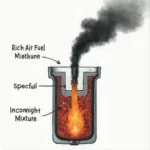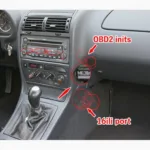The dreaded check engine light has illuminated your Infiniti QX56’s dashboard, and your OBD2 scanner displays the ominous codes P1168 and P1051. Don’t panic! This article provides a comprehensive guide to understanding these codes, their potential causes, and how to address them. We’ll explore everything from basic diagnostics to more complex solutions, empowering you to tackle these issues head-on.
Decoding P1168 and P1051 in Your Infiniti QX56
P1168 and P1051 are OBD2 codes related to the air/fuel mixture system in your QX56. Specifically, P1168 points to a problem with the Air Fuel Ratio (A/F) sensor, while P1051 indicates an issue with the A/F sensor heater circuit. These two codes often appear together, as a malfunctioning heater can impact the sensor’s ability to provide accurate readings.
What Does P1168 Mean?
P1168 indicates that the A/F sensor is reporting a lean condition, meaning there’s too much air and not enough fuel in the mixture. This imbalance can lead to reduced engine performance, decreased fuel economy, and potential damage to the catalytic converter.
What Does P1051 Mean?
P1051 signals a problem with the heating element within the A/F sensor. This heater is crucial for bringing the sensor to its optimal operating temperature quickly, ensuring accurate readings during cold starts and varying engine conditions. A faulty heater can cause the sensor to provide incorrect data, leading to the ECM adjusting the air/fuel mixture incorrectly and triggering other codes like P1168.
Common Causes of P1168 and P1051
Several factors can contribute to these error codes. Some of the most common include:
- Faulty A/F Sensor: The sensor itself may be damaged or worn out, requiring replacement.
- Wiring Issues: Damaged or corroded wiring to the sensor can disrupt the signal and heater circuit.
- Vacuum Leaks: Leaks in the intake manifold or vacuum hoses can introduce unmetered air, causing a lean condition.
- Exhaust Leaks: Leaks in the exhaust system before the sensor can also affect its readings.
- Fuel Pressure Problems: Low fuel pressure can result in a lean mixture.
- Faulty ECM: In rare cases, a malfunctioning Engine Control Module (ECM) can misinterpret sensor data or fail to control the heater circuit correctly.
Diagnosing and Fixing P1168 and P1051
Before replacing any parts, it’s important to perform a thorough diagnosis to pinpoint the root cause.
- Inspect the Wiring: Check the wiring harness for damage, corrosion, or loose connections. Repair or replace any faulty wiring.
- Check for Vacuum Leaks: Use a vacuum gauge or carburetor cleaner to test for leaks in the intake manifold and vacuum hoses.
- Inspect the Exhaust System: Look for leaks or damage in the exhaust system, particularly before the A/F sensor.
- Test Fuel Pressure: Use a fuel pressure gauge to verify that the fuel pump is delivering the correct pressure.
- Test the A/F Sensor: Use a multimeter to check the sensor’s resistance and voltage output. Compare the readings to the manufacturer’s specifications.
Expert Insights
“Often, a simple wiring issue can trigger both P1168 and P1051. Before jumping to conclusions about a faulty sensor, thoroughly inspect the wiring harness.” – David Miller, Automotive Diagnostics Specialist
“Don’t overlook the possibility of vacuum leaks. A small leak can significantly impact the air/fuel mixture and trigger these codes.” – Sarah Johnson, ASE Certified Master Technician
Conclusion
Addressing P1168 and P1051 in your Infiniti QX56 requires a systematic approach to diagnosis and repair. By understanding the underlying causes and following the troubleshooting steps outlined above, you can effectively resolve these issues and restore your vehicle’s performance. Ignoring these codes can lead to more serious problems, so prompt action is essential.
FAQ
- Can I drive my QX56 with P1168 and P1051? While you can technically drive with these codes, it’s not recommended. A lean air/fuel mixture can damage the catalytic converter and reduce fuel efficiency.
- How much does it cost to replace an A/F sensor? The cost varies depending on the specific sensor and labor rates, but typically ranges from $200 to $400.
- Can I replace the A/F sensor myself? With basic mechanical skills and the right tools, you can replace the sensor yourself. However, if you’re unsure, it’s best to consult a qualified mechanic.
- What other codes are commonly associated with P1168 and P1051? P0171 (System Too Lean Bank 1) and P0174 (System Too Lean Bank 2) are often related.
- Will clearing the codes fix the problem? Clearing the codes will temporarily remove the check engine light, but the underlying issue will persist and the codes will return.
- How can I prevent these codes in the future? Regular maintenance, including checking for vacuum leaks and inspecting wiring, can help prevent these codes.
- What tools do I need to diagnose these codes? An OBD2 scanner, multimeter, and vacuum gauge are helpful for diagnosing P1168 and P1051.
For further assistance, please contact us via WhatsApp: +1(641)206-8880, Email: [email protected] or visit our office at 789 Elm Street, San Francisco, CA 94102, USA. Our customer support team is available 24/7.

